- Home
- Steve Rasnic Tem
Blood Kin Page 3
Blood Kin Read online
Page 3
Sadie was scared. She’d never seen him hurt before. She had no idea what he might do now.
The road went steepdown for a time before leveling out in the bottom land. Here it flooded over all the time, but this had been a dry summer and the creek was way below what it ought to be.
They said it was a Gibson that discovered this hollow, following the Big Muddy Creek back to source. Walt Gibson, a big man. Daddy said he had to stoop to get into any house in the hollow, except his own. He built that one big, and well, and it would still be standing to this day if he hadn’t requested that it be burned to the ground, with his body in it, when he died. Sadie figured that must have been a mighty big disappointment for his wife.
The hollow was full of bear, deer, and small game back then. They said Walt found the first level place near the source, cut the trees down with an axe — the only tool he had — the first day, and built his cabin complete the next.
Off by himself like that, he married an Indian woman, the first woman he saw. Then two of their children got married to each other, the Indian woman died, and then Walt married one of his granddaughters when she was thirteen and he was eighty-two. And he still bore six more children with her. Willy married Mae, Henry married Susie, and their son Jackson married the daughter of a man who lived over on Spence’s Mountain across the county line. Another of Walt’s sons, Orson, married Willy’s daughter Cleo (her middle name was Patricia and everybody called her “Cleo Patty”) and she outlasted them all. Whenever any of the older Gibsons talked about “Ma,” Cleo was the one they were talking about. She was gone before Sadie was born, but any time she messed up people would say “think of your grandma in heaven looking down on you,” and she did, and it always gave her an awful feeling that Grandma Cleo was this wonderful woman that Sadie never could be. Except she had that special Gibson talent, just like Grandma Cleo had.
Orson and Cleo Patty had Bobby, who was Sadie’s daddy; Ralph, the quiet one who, with his wife Mattie, pretty much kept to themselves, only going to family events when they had to; Suzette, who was a scandal (“but what can you expect giving a child such a name,” according to the preacher); and Jesse, the youngest. Cleo Patty died giving birth to Jesse and that pretty much fixed his place in the family and in the world for all time.
The preacher’s real name was Jake, and his momma was a woman named Willa who’d been married to Henry for a brief time after his wife died. Willa hadn’t been seen in the valley since the morning she dropped her day-old baby off on Orson and Cleo Patty’s porch after leaving Henry, she said, for good. Henry never claimed the preacher as his own, but most everybody else just accepted the baby preacher as part of the family, and Cleo Patty doted on the child. When Cleo Patty died people said something died in little Jake Gibson as well.
Of course Bobby, Sadie’s daddy, had to stir up trouble. He was always saying that Henry wasn’t really the preacher’s daddy and so the preacher wasn’t even a proper Gibson at all, no matter who raised him. ‘Ma’ was just such a nice lady she’d be nice to the devil himself. In fact he used to say the preacher was half devil but only when he was real drunk and there weren’t nobody around to hear. Weren’t nobody more scared of the preacher than her daddy, and he grew up with him in the same house. But not as brothers, that was for sure.
They still called Sadie’s daddy Bobby, even though he was close to fifty now. Her mother was Dora Swenson, an outsider, and not fit according to most of the rest of the family. She was outside the family, and worse, from outside the valley. So she ended up doing extra chores for just about everybody except Great Uncle Jackson, who wouldn’t allow her in his house.
Sadie didn’t like the way the others treated Momma, but there weren’t much she could do about it. Besides, she didn’t know why she should care. Her momma had never seemed to have much use for her. She talked to Sadie as little as possible and Sadie didn’t dare ask her any favors. It had always been like that, as far back as Sadie could remember.
When Sadie asked her momma why she let the others treat her like that, why she just didn’t give it back to them, her momma just said, “Fool girl. You dont know nothin about it.”
Mr. Swenson, her momma’s daddy and her granddaddy, had a farm about twenty yards ahead, right at the bend of the road and the last house before you got into the town proper. He had moved from Spence’s Mountain to be closer to his daughter, to a plot of land he’d bought from Thomas Gibson, her daddy’s cousin. Her daddy had been mad enough to spit when cousin Thomas did that — they had a big fight and her daddy almost killed Thomas. Now Thomas lived out of the valley, on Spence’s Mountain, and his side of the family had no contact whatsoever with the Gibsons still in the hollow.
Sadie liked her granddaddy very much. Her daddy said he was a rich man who walked all over other folk as he saw fit to get his loot, but Sadie never believed that. She didn’t even believe he was all that rich; he sure didn’t show it.
She turned off the road and down the dry ruts of the path leading up to her granddaddy’s barn. He came out of the barn carrying two buckets of milk.
He was a tall old man, probably the lankiest she had ever seen. He walked as if all his legs and arms had been broken at one time or other. “What say there, Sadie?”
“Hidey, Granddad,” she said quietly. She sat down on a fence rail and watched as he carried the buckets into a shed. He was out a few minutes later, fasteninga padlock on the door. He turned and glanced at her, a little embarrassed, by the look of him. She stared at the ground.
“Sorry about that, Sadie. But you know if I dont lock it your daddy’s likely to sneak down here some evening and take my day’s milking.”
“He’s never been here…” Sadie felt the tears coming. “He wont even set foot here!” She was crying too hard now, so she climbed off the rail and stalked back up the path. She didn’t know why she was so upset this time; her daddy and granddaddy were always snapping about each other to whoever would listen. She guessed she was just tired of it, was all. They both talked like the other was about the worst crook what ever lived, and the stories were all made up. Most of them didn’t even make sense.
She could see the corner of Levitt’s General Store about a hundred yards ahead of her. The town was pretty full these days — folks were moving back from places like Ohio, and even as far away as Michigan. It was that depression people talked about, but nobody seemed to understand. All those families that moved away years ago looking for jobs were back because those jobs all went away. She had a cousin or two like that, who tried to get on at the mines but the mines weren’t hiring either. So they farmed — even though her granddaddy said the mountain land was the worst there was for farming. You had to have good river bottom land if you wanted to pull anything decent out of it. So people just hung around town, like something good might happen for them if other people just knew they were still alive.
Used to be she knew every face in town. Now she reckoned it was getting to be a lot like the big cities — she’d see maybe a dozen people she hardly knew and it was a little scary not knowing which one might be a friend or who was up to no good. A lot of people she didn’t know were milling around in front of the store. She felt a little bit shy about going past them, but maybe it was best they didn’t know her considering what she was about to do. She suddenly started feeling that excitement she always felt when she went to town — wondering who she’d see, what might happen, what she might be able to slip into the pocket of her yellow dress. She wanted people to notice her, wanted them to notice her every time she went into town. They’d be thinking, Who is that girl in that pretty yeller dress? She wondered how she was going to manage that this time.
Up on the left, just before you got to the store but halfway up the mountain above it, there were county wagons hauling off gravel and dirt and rock, what was left over after they plowed the rest over the slope. Mr. Levitt claimed they were going to bury his store one of these days, and the thought of that, the picture of Levitt’s General pa
cked floor to ceiling with greenish, moldy dirt, the customers and Mr. Levitt himself like mummies inside, filled Sadie with a strange feeling, like she’d looked into a grave. She wanted to peel all that stuff away, see what was really inside. Cause if you could see it, really see it, maybe then it couldn’t hurt you. But something told her people didn’t hold that to be a proper way of seeing things.
They had already planted some kudzu up there — that was that big vine the state people had brought in from Jap-an that everybody said would grow on anything, even your arm if you left it there too long. The highway department kept telling Mr. Levitt that was what was going to keep the bank from coming down and covering his store. The kudzu had these big green leaves that had three parts to them, and here and there you’d see these dry, papery pods. The leaves and stems grew out from these long runners the vine put out over everything.
The flowers were supposed to be big and purple, but one of the county workers said he’d only seen it flower a few times, maybe because they’d moved it from where it belonged and it didn’t know how to act no more.
And it almost never made normal seed, even if it did start to bloom. It was like one of those big, sick, dumb babies that were born in the hollow from time to time. Born too big with a small piece withered here and there, and no brain to speak of, but Lord, how they grew! Those big dumb ugly babies would grow bigger than anyone else in the family, like as not.
The town was busy. Lots of folks in for their regular store-buying. A lot of horse-trading going on — men shouting at the top of their lungs, talking about how great their animals were and other men — the smart ones, mostly — sitting back and listening, nothing showing on their faces. And there was old lady Millburn, the only woman who traded animals in these parts.
Several men and Mickey-Gene, her cousin the idiot, were sitting out in front of Levitt’s General. PeteyCarter among them, his white beard stained mahogany from all the tobacco juice. Now and then he’d say something quiet and Mickey-Gene would turn slow and look at him, then laugh out loud like he had heard a joke. Mickey-Gene probably hadn’t understood a word. He’d just heard other people laugh some time or other, and liked the way it sounded. Sadie thought it must be a terrible thing not to be able to tell when somebody was joking. People could be laughing at you all the time, like they did with Mickey-Gene. If something ever happened to her brain, well, she just hoped she would die.
Mickey-Gene’s momma had been Suzette, the family scandal. She’d had Mickey-Gene when she wasn’t married; nobody knew who the father was. Somehow Mickey-Gene had ended up being raised by Uncle Ralph and his wife Mattie. They pretty much kept to themselves so Sadie didn’t see them much. Her daddy thought they were uppity, too good for the rest of the family. Sadie just figured they didn’t like all the nonsense the Gibsons got into, and besides, they probably had their hands full with Mickey-Gene.
She caught herself staring at Mickey-Gene, his mouth opening with no sound, turning to her, his gray eyes floating to the top of his white face. She felt a sick, confused feeling, her thoughts getting their wings and flying away from her…
Sadie jerked away from his face. That kind of scary stuff had happened several times the week past. She touched her lower belly, and then pressed. It wasn’t going to happen, not to her. She wouldn’t let it. She could keep the blood back if she just didn’t get confused by it. She had to keep her head set on that one thing.
George Mackey came out of Levitt’s and just stood there, staring at her. She made herself stare right back. Then he started talking to the others and she was amazed at how they all perked up, taking him seriously. Even Mickey-Gene, struggling to make his face look serious like the others, but he only made himself look even more comical.
Only fools, idiots, and worse took George Mackey serious. She watched as he pushed back on his bent top hat, and then pulled up on his blue-black pants legs so he could crouch by Mickey-Gene and whisper something in his ear.
Mickey-Gene looked startled, glanced over at Sadie standing out in the road, his white face making his red hair look even redder.
Sadie walked on up the street, trying to keep the tears from coming. It was hard, she was so mad. But she knew these men. Once they saw a weakness, they never forgot it. They’d hit on it every time they saw you after that.
She slowed down almost to a stop as she got closer to Miss Perkins’ dress shop. Although it wasn’t just a dress shop no more — she had books and magazines and little statues and pictures and cards and all kinds of knick knacks in there now. She just never could sell enough dresses. But “Dress Shop” sounded real good, sounded fancy, and Miss Perkins must’ve figured that brought the customers in.
Some of the women up the hollow near where Sadie lived did seem to take Miss Perkins’ place pretty serious. They’d speak in hushed tones about what nice things she sold them, what expensive things, and half the time they’d go into that shop just to admire, not really intending to buy. That didn’t seem to bother Miss Perkins. Sadie figured most of those things were just for show anyway. More than once she’d seen Miss Perkins offer something for sale a whole month then wear it herself out in Morrison, probably just like she’d wanted all along. Miss Perkins would do her best to talk a customer out of it if they wanted to buy one of her nicer things. Miss Perkins’ place was just for show, like a movie theatre (which the town didn’t have) or a meeting hall (which they did). Women got themselves all gussied up just to go.
Miss Perkins didn’t need the money no how. Her father had been one of the richest men in the valley, a dairy farmer, and when he died he left her enough money that she’d never have to work. Or so people said — Sadie didn’t know first-hand.
Miss Perkins’ Dress Shop was Sadie’s favorite place for lifting things. “Lifting” was what they called it in that old pulp magazine her granddaddy gave her. It meant stealing. With all those pretty things lying around out in the open — Miss Perkins didn’t have no glass display cases — it was hard to resist.
But now Miss Perkins watched her like a hawk every time she came in, but so far she hadn’t done nothing about it. Probably too embarrassed to. Probably thought her Dress Shop was too fancy a place for anything as nasty as stealing to be going on. Lifting. Or maybe she was scared of Sadie’s daddy, the roughest man by anybody’s count in the whole town.
Or maybe Miss Perkins was afraid of Sadie because she was a Gibson, and the preacher’s niece. That just might be. Most people in the town didn’t think the hollow Gibsons were right folk at all. They were Indian or Spanish or Nigger or something. Not rightly human, whatever.
They were spirited, them Gibsons. Black nasty magical.
SADIE RAN UP the steps in front of Miss Perkins’ as fast as she could, holding her arms out straight in front of her. She hit the door flat with her palms, so hard it burnt, and was quite satisfied with the explosion it made when it struck the wall. She ran into the middle of the shop, breathless, eyes peeled for Miss Perkins.
Miss Perkins started to shout something, and then Sadie saw her eyes when she recognized who it was. She looked down at her magazine again. Sadie had to hold her belly to keep from laughing.
Most of the stock was the same goods Miss Perkins had always had, long as Sadie could remember. Seemed like she hadn’t sold hardly nothing out of the fancy stuff. Mostly people would buy a card or some stationery, one of the cheaper clay doodads or some ornament like a hairpin or sewing supplies or one of the dress patterns in a shiny metal box by her desk. Sadie figured Miss Perkins had to carry those things, else she’d never sell a thing, and pretty soon folks’d be too embarrassed to come in and browse no more. It surprised Sadie that no one else had been able to figure that out, but maybe they had, and they just weren’t passing the word around out of respect or affection or more likely good neighborliness for Miss Perkins.
There were a few real nice doodadsSadie hadn’t seen before, though — a little ceramic statue with a bright orange painted bear sniffing around a barrel that said
“HONEY” on it. And a little angel with gold wings sitting on a bright blue mushroom. And a set of ivory-colored celluloid brushes, with mirror and a real cute soap container with a picture of a flower on it.
Miss Perkins was watching her close. She’d have to be careful.
Sadie had never been sure why she stole all the time, just that it excited her. It was something different; it seemed to add an extra tang to the day, made her feel like she was smarter than the people she was fooling, especially the grownups. She was poor, too. She supposed that might be reason enough, except she usually didn’t care too much for the stuff she stole. She could have done without it.
She knew it was wrong, but that never seemed to bother her enough not to do it. There was lots of things folks in Morrison did was wrong — like giving her family such a hard time because of being what they was, and other things, things that people were dumb and superstitious about. So her one wrong thing didn’t seem so bad.
Miss Perkins was talking to Alice Watkins, who’d come in to admire the ceramics lining the back shelf. Some of the finest pieces were on display there: the little shepherd with his four sheep, the scenes from fairy tales like Red Riding Hood, Snow White, and Rumpelstiltskin, the eight or nine different clowns, the twelve different vegetables. Alice Watkins came in almost every day to admire, and about twice a year she probably actually broke down and bought something.
“I have that figure of the old fat man on the ledge of my parlor window so that it catches the light just so. Do you know he just looks at me wherever I go in the room? And everybody says something about it, Miss Perkins, they surely do. It’s the conversation piece in my house, it surely is.”
Sadie had heard the story a hundred times. Alice Watkins seemed to find a way to drop that ceramic into every single conversation. But where most shop keeps would fall all over themselves trying to be agreeable with a customer like that, Miss Perkins just looked bored, or maybe a little worse than that — annoyed.

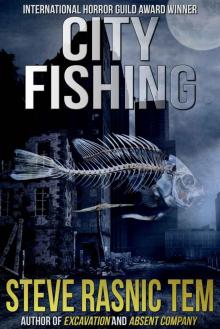 City Fishing
City Fishing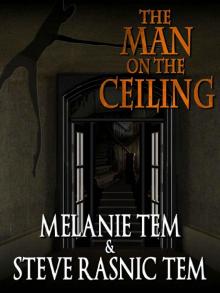 The Man on the Ceiling
The Man on the Ceiling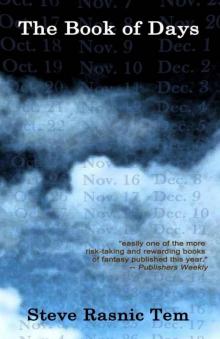 The Book of Days
The Book of Days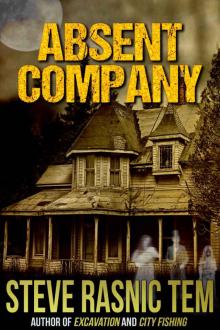 Absent Company
Absent Company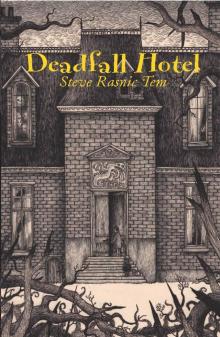 Deadfall Hotel
Deadfall Hotel Celestial Inventories
Celestial Inventories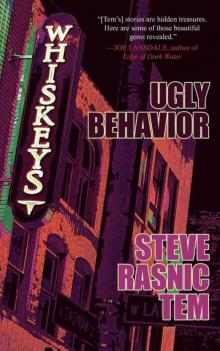 Ugly Behavior
Ugly Behavior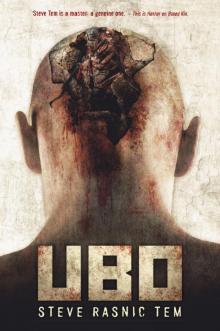 Ubo
Ubo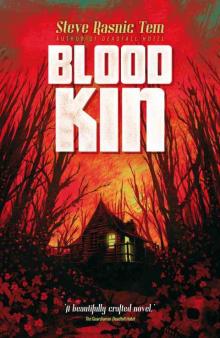 Blood Kin
Blood Kin